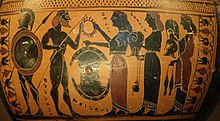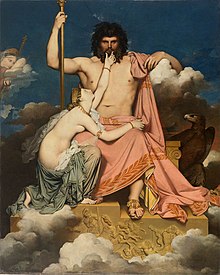Thetis (Nereid)
In Greek mythology, Thetis (in ancient Greek Θέτις / Thetis), the one with silver feet, is a sea nymph, one of the fifty Nereids, daughters of the "ancient god of the seas" (ἅλιος γέρων: halios geron), Nereus, and the oceanid Doris, and granddaughter of the titanid Thetis (Greek Τηθύς "Teethys& #34;), with whom she is often confused in Spanish. When she is described as a Nereid in classical myths, she is the one who often seems to lead the other Nereids as they attend to her tasks. Sometimes Themis, the embodiment of the laws of nature, is also confused with her. She was educated by Hera, who always helped her.
Some sources claim that Thetis was one of the oldest deities to be worshiped in Archaic Greece, from which time oral traditions and written records have been lost. There is only one written record, a fragment, attesting to her cult, and there is an ancient hymn by Alcmán that identifies Thetis as the creator of the universe. Historical writers such as Pausanias have claimed that the cult of Thetis as the goddess persisted in some regions.
In the mythological cycle of the Trojan War, the wedding of Thetis and the Greek hero Peleus is one of the triggering events in the war, which also led to the birth of the couple's son, Achilles.
Thetis as goddess
Although most extant material on Thetis concerns her role as mother of Achilles, and although she is largely a creature of poetic fantasy, rather than a cult goddess in her historical period, some hints and fragmentary references suggest a older layer of tradition in which Thetis played a much larger role in the religious practices and imagination of some Greeks.
The etymology of its name (from τίθημι tithemi, 'to constitute', 'to establish') suggests an initial political role.
In the Iliad, Achilles reminds his mother of her role in defending, and therefore legitimizing, the kingdom of Zeus in the face of an incipient rebellion of three Olympians, all of them with pre-Olympian roots:
You were glorified of having avoided, you alone among the immortals, a shameful disgrace to the Chronion /Zeus/, which piles up the gloomy clouds, when they wanted to bind other Olympic gods: Hera, Poseidon and Athena Palas. You, O goddess, came and delivered him from the bonds, calling the spacious Olympus the centiman whom the gods named Briareo and all the Aegean men, who is superior in strength to his own father/Uranus/, and then sat beside Zeus, the uphan of his glory; they feared him the blessed gods, and they stood by his purpose.
Quintus of Smyrna, recalling this passage, writes that Thetis once freed Zeus from his chains, though there are no other references to this rebellion among the Olympians.
In a fragment of a hymn by the Spartan poet from the seventh century B.C. C. Alcmán, Thetis appears as a demiurge, beginning her creation with πόρος poros ('path', 'path') and τέκμωρ tekmor ('milestone', 'post of goal'). The third was σκότος skotos ('darkness'), and then the sun and moon. This cosmogony is interesting not only because it captures Near Eastern astronomical and theological speculations, but also because its first principles are the basic elements of a racetrack, reflecting the athletic concerns of Spartan society and education. Since Thetis is the mother of Achilles, the quintessential Greek youth, it could be that Thetis once presided over the sphere of importance of aristocratic adolescence.
Thetis and the other gods
The Library of Mythology of Pseudo-Apoldorus says that Thetis was once courted by both Zeus and Poseidon. She was given in marriage to the mortal Peleus only on the prophecy of Themis, Prometheus, or Tracings that his son would stand out from his father.
When Hephaestus was born he was thrown from Olympus by his mother Hera, since she felt ashamed of her son's limp, the oceanid Eurynome and Thetis welcomed him and took care of him in a cave in the sea. He did blacksmith work there for them.
in the deepest part of the cave, and the surrounding course of the Ocean passed eternally with its foam and its murmur.
When Dionysus was expelled by Lycurgus with the help of the Olympians, he went to take refuge with Thetis in the Erythrean Sea on a bed of algae.
Thetis, Achilles and the Trojan War
Thetis is the mother of Achilles with Peleus, king of the Myrmidons. Both Poseidon and Zeus were interested in her, but a prophecy from Themis revealed that her son would be greater than her father, so they arranged for her to marry a mortal man.
The gods sent Iris (who is with Hermes the messenger of the gods) to find a mortal worthy of joining Thetis. Iris went to see the centaur Chiron, one of the most famous sages of antiquity, who would later be Achilles' tutor. Among the disciples of Chiron, the young Peleus, son of Aeacus, whom he held in great esteem, stood out for his beauty, intelligence and courage. Peleus courted Thetis but she, feeling humiliated by the imposition of the gods, rejected him. Given this, Chiron advised Peleus to look for the sea nymph when she was asleep in the cave he used to go to, and tie her tightly to prevent her from escaping by changing shape. Which she did, transforming herself into a flame and a roaring lion (compare the sea god Proteus). But Peleus stood his ground. Thetis consented to marry him, although without love or interest.
The wedding of Thetis and Peleus took place on Mount Pelion and was attended by all the deities: there the gods celebrated the marriage with a banquet. Apollo played the lyre and the Muses sang, says Pindar. At the wedding Chiron gave Peleus a spear made of ash wood whose power resided in healing the wounds he inflicted and Poseidon the immortal horses, Xanthus and Balio. However Eris, the goddess of discord, had not been invited. In revenge, she threw a golden apple on which she said "for the most beautiful". (The ensuing dispute between various goddesses led to the Judgment of Paris and ended up causing the Trojan War.)
Thetis and Peleus had several children, but Thetis, as soon as they were born, suffocated them so that they would not inherit mortal traits from their father. Peleus became suspicious and discovered at the birth of Achilles, their seventh son, that Thetis subjected them to a ritual to try to make them immortal, but ended their lives: she used her magic on the baby at night, burning their mortality in the hearth fire. and anointing the child with ambrosia during the day, Apollonius recounts. When Peleus caught her burning the child, she let out a scream. "Thetis heard him, and reaching for the child, she flung him screaming to the floor, and like a gust of wind it rushed across the room and jumped into the sea, furious, and never returned since." Interrupted by Peleus, Thetis made her physically invulnerable save for her heel, which she was about to burn when her husband stopped her.
In a variant of this myth, Thetis tried to make Achilles invulnerable by immersing him in the waters of Styx (the river of Hades). However, the heel by which he held him was not protected by the waters of the Styx. In the story of Achilles in the Trojan War narrated in the Iliad, there is no mention of this weakness of Achilles on his heel.
Peleus then gave the child to Chiron to raise.
The prophecy said that the son of Thetis would have a long but boring life, or glorious but short. When the Trojan War broke out, Thetis was worried and she hid Achilles in the court of Lycomedes, disguised as a woman. But she ended up going with the rest of the Greeks anyway. Seeing that she could not prevent her son from fulfilling her destiny, she Thetis had Hephaestus forge a shield and armor, but then she refused to pay him the sexual favors she had promised him in return.
When Paris killed Achilles, Thetis came from the sea with the Nereids to mourn his death, enshrining his ashes in a golden urn, erecting a monument to his memory, and instituting festivals of commemoration.
Contenido relacionado
The great Dictator
Samaria
Maximilien Robespierre



